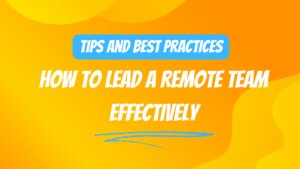Developing People Skills: Why They Matter and How to Improve Them
People skills, also known as soft skills or interpersonal skills, are a set of abilities that enable individuals to interact effectively with others.
In the workplace, people skills are essential for building positive relationships, resolving conflicts, and fostering a productive and collaborative environment.
The importance of people skills in the workplace cannot be overstated. A study by the Harvard Business Review found that 85% of job performance is determined by soft skills, while technical abilities determine only 15%.
Additionally, a survey conducted by the Society for Human Resource Management found that 90% of hiring managers consider soft skills just as important as technical skills.
These statistics demonstrate that no matter how technically sound an employee may be, lacking strong people skills, they are unlikely to succeed.
Given the crucial role people skills play in the workplace, developing and improving them is important. Here are some tips for doing so:
Communicate effectively
Effective communication is a fundamental people skill essential for building positive relationships and resolving conflicts in the workplace.
It involves not only being able to express oneself clearly but also actively listening to others, understanding what they are saying, and responding appropriately.
To improve your communication skills, focus on being clear, concise, and direct. Additionally, listen to others actively and be open to feedback.
Practise active listening, which means fully paying attention to the person speaking and understanding their perspective.
Build positive relationships
Strong, positive relationships with colleagues, supervisors and clients are essential for workplace success.
This means understanding the personalities, strengths, and weaknesses of the people you interact with.
When you better understand the people you interact with, it’s easier to connect with them, build trust and establish a foundation for effective communication.
To build positive relationships, focus on being trustworthy, dependable, and respectful. Additionally, try to understand others’ perspectives and find common ground.
Manage conflicts effectively
In today’s fast-paced work environment, being adaptable and flexible is essential. This means being willing to adapt to new technologies and approaches, as well as being able to adjust to changes in the company or industry.
A growth mindset, being open to learning, and looking for new ways of doing things, can set you up for success in today’s rapidly changing world.
To improve in this area, focus on being open to change and new ideas. Additionally, make an effort to be willing to try new things and to learn from your mistakes
Be adaptable and flexible
Consistency is key when it comes to building and maintaining your employer brand. Ensure that your employer brand is reflected in your internal and external communication, from job postings and employee onboarding to company updates and social media posts.
It’s also important to be consistent in treating candidates and employees. Make sure your company values and culture are reflected in your policies and practices, and hold yourself accountable.
Develop empathy
Empathy is the ability to understand and share the feelings of others. It’s important for building positive relationships and for managing conflicts effectively.
Understanding someone else’s point of view, even if it’s different from ours, is crucial to maintaining a positive and productive work environment. To develop empathy, focus on being understanding and compassionate.
Additionally, please try to see things from others’ perspectives and be open to their feelings and needs.
Putting yourself in the shoes of others, understanding what they are going through, and showing compassion will help you build deeper connections with them.
Develop leadership skills
Strong leadership skills are important for leading teams and projects and driving success within the organisation.
This includes the ability to inspire and motivate others, as well as being able to make difficult decisions. Strong leaders also can delegate effectively and build a cohesive team.
To develop leadership skills, focus on honing your decision-making abilities, build your public speaking and presentation skills, work on your ability to inspire others, and learn how to build and lead teams effectively.
There are some lesser-known tips for developing people skills –
Practice mindfulness: Mindfulness is being present and aware of one’s thoughts, feelings, and surroundings. It can be helpful in the workplace as it allows individuals to be more aware of their own emotions and reactions and those of others, making it easier to connect with and understand others.
Mindfulness practices such as meditation, yoga, and deep breathing can help to improve people skills by promoting self-awareness and emotional regulation.
Build a strong online presence: In today’s digital age, building a strong online presence is essential for professional success. This includes being active on social media, creating a personal website, and having a professional email address.
A strong online presence can help establish credibility, build connections, and establish a positive reputation, which can be helpful in building and maintaining relationships in the workplace.
Seek feedback: It can be challenging to know how others perceive us. Seeking feedback can help identify areas where one may need to improve and can provide valuable insight into how others view you.
It’s important to be open to feedback, whether it’s positive or negative, and to not take it personally. Once you receive feedback, take the time to understand it and plan how to improve it.
Take classes: many classes can help to develop specific people skills, such as communication, negotiation, and conflict resolution. By taking classes, one can gain new knowledge and insights and learn from experienced professionals. It’s also a great opportunity to network and connect with other professionals.
Volunteer: Volunteering is an excellent way to develop people skills. It provides the opportunity to interact with diverse groups of people and allows individuals to practise skills such as communication, teamwork, and leadership in a low-pressure environment. It’s also a great way to give back to the community.
Conclusion
People skills are essential for success in the workplace. Individuals can improve their people skills and, ultimately, their job performance by focusing on effective communication, building positive relationships, managing conflicts, being adaptable and flexible, and developing empathy and leadership skills.
It’s important to regularly evaluate and work on improving these skills, as they are key to personal and professional growth. The key is approaching each interaction as an opportunity to learn, grow, and develop professionally.
Remember to be patient with yourself and focus on building skills one at a time. Improving people skills takes time and practice, but the rewards are well worth the effort.
Want to improve your people skills even further?
At Notesday Academy, we offer communication, conflict resolution, and emotional intelligence courses that take your skills to the next level.
With our expert instructors and practical, hands-on training, you’ll gain the knowledge and skills you need to excel in the workplace.
To learn more, visit our website at www.notesdayacademy.com
Topic Categories
Get the latest updates
Sign up for our most recent posts
Take out some time to read. No spam, we will email you when a new post is published.




